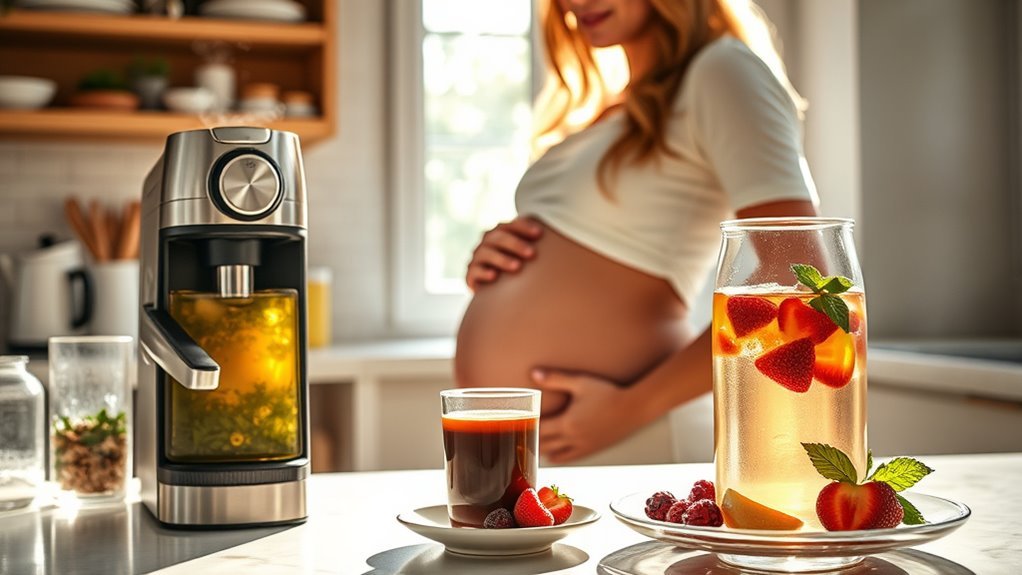Coffee and Pregnancy: Is It Safe to Drink Coffee While Pregnant?
You can usually enjoy coffee during pregnancy if you keep your caffeine intake below 200 milligrams a day—about one 12-ounce cup. Your body processes caffeine slower while pregnant, so staying within this limit helps protect your baby’s development and reduces risks like low birth weight. Pay attention to how caffeine affects you and track all sources, including tea and chocolate. If you want to know how to balance your coffee habits safely and explore alternatives, there’s more helpful info ahead.
Understanding Caffeine and Its Effects on Pregnancy

Although moderate caffeine consumption is common in daily life, it’s important to understand how caffeine affects pregnancy because it crosses the placenta and can impact fetal development. When you consume caffeine, your body metabolizes it at varying rates, but during pregnancy, caffeine metabolism slows down considerably. This means caffeine remains in your bloodstream longer, increasing fetal exposure since the fetus cannot efficiently metabolize it. Research shows that excessive caffeine intake may influence fetal development, potentially affecting growth and increasing the risk of complications. However, moderate consumption within recommended limits is generally considered safe and unlikely to cause harm. Understanding these dynamics helps you make informed choices, balancing your freedom to enjoy coffee while prioritizing your baby’s healthy development.
Recommended Caffeine Limits for Expecting Mothers
Knowing how caffeine affects your body and your baby sets the stage for understanding safe consumption levels during pregnancy. Because caffeine metabolism slows down during pregnancy, your body processes caffeine more slowly, which means it stays in your system longer. Health experts generally recommend limiting caffeine intake to about 200 milligrams per day—roughly one 12-ounce cup of coffee—to balance your pregnancy cravings and guarantee safety. This limit helps you enjoy your coffee without overloading your system or affecting your baby. Staying within these guidelines gives you the freedom to savor your favorite brew responsibly, knowing you’re supporting a healthy pregnancy. Always listen to your body, and if you notice changes in how caffeine affects you, adjust accordingly or consult your healthcare provider for personalized advice.
Potential Risks of Excessive Coffee Consumption During Pregnancy
When you consume more caffeine than recommended during pregnancy, it can increase the risk of complications such as low birth weight, preterm birth, and miscarriage. During pregnancy, your caffeine metabolism slows down considerably, meaning caffeine stays in your system longer and reaches the fetus more easily. This prolonged exposure may affect fetal development and contribute to pregnancy complications. While moderate coffee intake is generally considered safe, excessive consumption can strain your body and your baby’s growth. Understanding these risks helps you make informed choices without feeling restricted. Remember, it’s about striking a balance that respects both your desire for freedom and the well-being of your baby. Staying mindful of caffeine amounts supports a healthier pregnancy journey for you and your little one.
How to Monitor and Reduce Your Caffeine Intake

You can keep your caffeine intake in check by tracking how much you consume daily, including all sources like coffee, tea, and chocolate. Choosing safe alternatives, such as decaffeinated coffee or herbal teas, can help reduce your overall caffeine without sacrificing comfort. These simple steps make it easier to stay within recommended limits and support a healthy pregnancy.
Tracking Daily Caffeine
Although caffeine is a common part of many daily routines, keeping track of your intake during pregnancy is essential for your baby’s health. Effective caffeine tracking helps you stay within recommended daily limits, typically around 200 mg. To manage your intake:
- Note all sources of caffeine, including coffee, tea, chocolate, and some medications.
- Use apps or journals to log your daily caffeine consumption accurately.
- Estimate caffeine content per serving, considering brewing strength and portion size.
- Adjust your habits gradually, replacing high-caffeine drinks with lower-caffeine options.
Safe Coffee Alternatives
Several safe coffee alternatives can help you reduce caffeine intake without sacrificing comfort or flavor during pregnancy. Herbal coffee blends, made from ingredients like chicory, dandelion root, or roasted barley, offer a satisfying, coffee-like experience without caffeine. These coffee substitutes allow you to enjoy your ritual while keeping caffeine levels low. To monitor your intake effectively, consider replacing one or two cups of regular coffee with herbal coffee daily. You can also explore decaffeinated coffee options, but be mindful of residual caffeine content. By gradually integrating these substitutes, you maintain your sense of freedom and enjoyment while prioritizing your baby’s health. Remember, always check product labels and consult your healthcare provider to verify your chosen alternatives align with your pregnancy needs.
Healthier Alternatives to Coffee for Pregnant Women

If you’re looking to reduce caffeine while still enjoying a warm drink, herbal teas like ginger or chamomile offer safe, soothing options backed by research. Decaffeinated coffee can also provide the familiar taste without most of the caffeine, making it a practical choice during pregnancy. Additionally, nutrient-rich fruit infusions not only hydrate you but also deliver beneficial vitamins and antioxidants for you and your baby.
Herbal Tea Options
While you’re cutting back on coffee during pregnancy, herbal teas can offer a comforting and safe alternative. The herbal tea benefits include being naturally caffeine free options, which help reduce caffeine intake without sacrificing warmth or flavor. Here are four safe choices to evaluate:
- Ginger tea – Eases nausea and supports digestion.
- Rooibos tea – Rich in antioxidants and naturally caffeine free.
- Peppermint tea – Soothes upset stomach and relaxes muscles.
- Chamomile tea – Promotes relaxation but should be consumed moderately.
Always choose high-quality teas and consult your healthcare provider if unsure. These herbal options help you enjoy your favorite ritual freely, while prioritizing your and your baby’s well-being during pregnancy.
Decaffeinated Coffee Benefits
Though you might be cutting back on regular coffee, decaffeinated coffee offers a comforting alternative that lets you enjoy the familiar taste without the same caffeine concerns. Decaf benefits include considerably reduced caffeine content—typically 97% less—making it a safer choice during pregnancy when limiting caffeine is advised. Choosing decaf provides a way to satisfy your coffee cravings while minimizing potential risks like increased heart rate or disrupted sleep. As one of the preferred caffeine alternatives, decaf supports your desire to maintain routine and comfort without compromising your baby’s health. Just be mindful to select brands with minimal chemical processing. Overall, decaffeinated coffee offers a balanced approach, giving you the freedom to enjoy coffee’s flavor with greater peace of mind throughout your pregnancy.
Nutrient-Rich Fruit Infusions
Decaffeinated coffee offers a reduced-caffeine option, but you might want to explore beverages that bring added nutritional benefits to your pregnancy diet. Nutrient-rich fruit infusions provide a revitalizing alternative, combining hydration with essential vitamins and antioxidants. Here are four fruit combinations to reflect on:
- Orange and blueberry: Rich in vitamin C and antioxidants to support your immune system.
- Lemon and ginger: Aids digestion and offers anti-inflammatory properties.
- Strawberry and kiwi: Packed with vitamin C and folate, important for fetal development.
- Apple and cinnamon: Provides fiber and helps regulate blood sugar levels.
These infusions not only hydrate but also supply nutrient benefits that support both you and your baby’s health. Enjoy these flavorful options to diversify your beverage choices safely during pregnancy.
Tips for Enjoying Coffee Safely While Pregnant
If you enjoy coffee, you don’t have to give it up entirely during pregnancy, but it’s important to keep your intake within safe limits. To enjoy coffee safely, try limiting yourself to about 200 milligrams of caffeine per day, roughly one to two cups. Embrace mindful drinking by savoring your coffee rituals—slow down, enjoy the aroma, and truly taste each sip. Choosing lower-caffeine options like decaf or half-caf can also help you feel free to indulge without overdoing it. Pay attention to how your body responds, and stay hydrated with water alongside your coffee. By balancing enjoyment with caution, you can maintain your love for coffee while supporting your pregnancy’s health. This approach lets you cherish your coffee moments without worry.
Frequently Asked Questions
Can Decaf Coffee Be Consumed Freely During Pregnancy?
Like choosing a gentler path on a winding road, opting for decaf coffee offers you decaf benefits as a soothing caffeine alternative. While it’s generally safer during pregnancy, it’s wise not to consume it completely freely—moderation is key since tiny caffeine amounts remain. You can enjoy your cup with reassurance, embracing balance and freedom, but always consult your healthcare provider to tailor choices that best suit your unique journey.
Does Caffeine Affect Breastfeeding as Well as Pregnancy?
You might wonder if caffeine levels affect breastfeeding safety. The good news is moderate caffeine intake is generally safe while breastfeeding, as only small amounts pass into breast milk. However, too much caffeine could make your baby irritable or disrupt sleep. So, you don’t have to cut caffeine completely, but it’s wise to limit your intake to about 200-300 mg daily to keep both you and your baby comfortable and happy.
Are There Specific Coffee Brands Safer for Pregnant Women?
Choosing the “safest” coffee brand while pregnant can feel like searching for a needle in a haystack, but you’ve got options. Look for organic coffee—it’s often lower in pesticides and additives, which is reassuring. You might also explore caffeine alternatives like chicory or herbal blends to satisfy your craving without the jitters. Always check labels and consult your healthcare provider to enjoy your coffee freedom responsibly and confidently.
Can Coffee Consumption During Pregnancy Affect the Baby’S Sleep?
You might wonder if your coffee intake affects your baby’s sleep. Research shows caffeine crosses the placenta and can influence your baby’s developing nervous system, potentially disrupting baby sleep patterns. While moderate caffeine consumption is generally considered safe, high amounts may increase restlessness. So, it’s best to limit caffeine to support your baby’s calm sleep without feeling restricted—allowing you freedom to enjoy coffee responsibly during pregnancy.
How Does Caffeine Metabolism Change Throughout Pregnancy?
You’ll notice caffeine sensitivity increases as your pregnancy progresses because metabolic changes slow down caffeine clearance. Early on, your body processes caffeine much like before, but by the third trimester, caffeine stays in your system up to three times longer. This means you might feel its effects more strongly even with small amounts. Understanding this helps you adjust your intake freely and safely, aligning with your comfort and well-being.






